Trades on Best Conditions
100 +
TRADING INSTRUMENTS
Various investment types
100 +
PAYMENT METHODS
Vast deposit and withdrawal options for the hassle-free payments
0 $
СOMMISSION
No commission on deposit and withdrawal
Innovative Platform for Online Trading
In 2018, the broker celebrated a significant achievement by surpassing one million users on its platform. Today, in 2024, the company’s registered user base has soared past an impressive 10 million milestone. This remarkable growth make this online broker a standout player in the global brokerage industry.
Pocket Option is owned by Infinite Trade, while ensuring compliance with regulations through the Mwali International Services Authority (License T2023322).
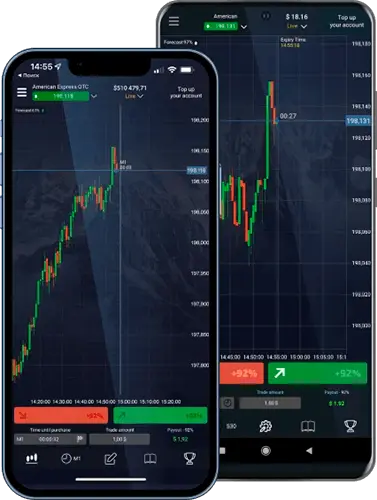
Reliable and Transparent Trading Platform
Over the years, a thriving community of like-minded individuals has emerged around this platform. Positive reviews from both novice traders and seasoned professionals can be found across social media, rating agencies, forums, and app stores.
Only in Pocket Option Philippines any user can test trading conditions and trading platform without registration. With one click of a button, any user of the company can try their hand at a demo account absolutely free of charge. Thus, the company demonstrates maximum openness and invites everyone to try out high technologies and an advanced trading platform.
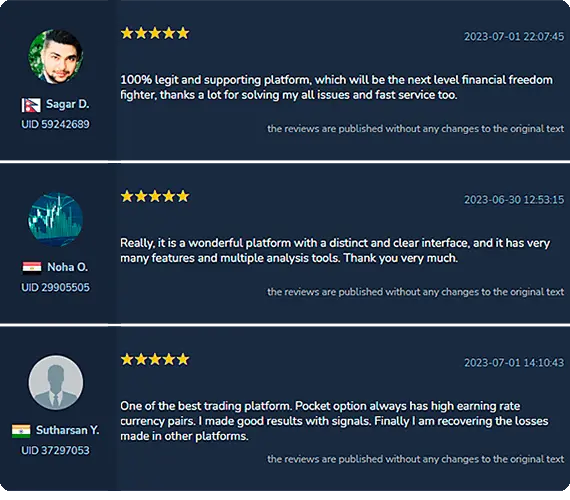
Protected and Comfortable Trading
With a safe authentication system, robust deposit protection, and stringent client data security measures, the company prioritizes safeguarding its clients’ interests.
Traders can trade with peace of mind knowing that their orders are executed flawlessly. The platform is dedicated to ensuring the utmost safety and security of their trading experience.
Moreover, the system’s reliability doesn’t compromise the user experience. Each trader can easily customize their security preferences, ensuring a seamless and personalized trading journey.
This flexibility empowers users to strike the perfect balance between convenience and security, making it a truly user-friendly platform that caters to individual needs.
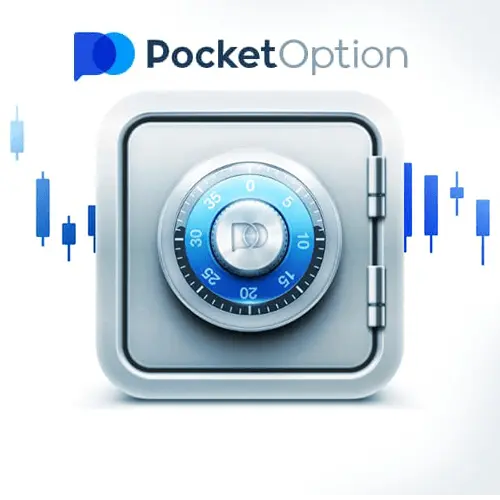
Become a Pro Trader with Pocket Option
Use a risk-free trade, cashback and other advantages for a more comfortable trading experience with minimal risks.
INDICATORS AND DRAWINGS
Use contemporary technical analysis techniques to make more accurate forecasts.
COMPREHENSIVE EDUCATION
Study our tutorials, guides as well as trading strategies – everything you need to get started.
SOCIAL TRADING
Copy trades of the most successful traders, earn with the best.
ACCESSED FROM ANY DEVICE
Convenient trading via web interface and mobile applications.
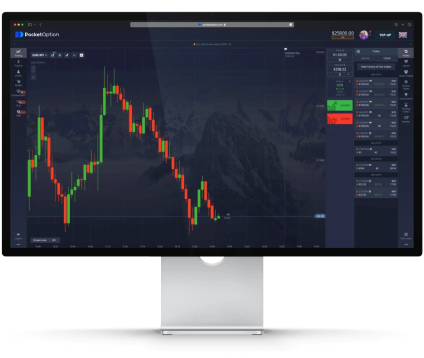
Pocket Option Broker – Everything You Need for a Seamless Trading Experience
$10 000 on your demo account
A full-fledged training environment to evaluate all the advantages of the platform using virtual funds.
Easy deposit and payout
$5 – minimum investment amount. Use the preferred payment method for a rapid and convenient processing
Support service 24/7
We are always ready to provide an assistance and answer any questions that may arise in a timely and professional manner
Easy and Fast Deposits/Withdrawals
Traders can utilize bank cards, cryptocurrency payments, and electronic wallets for deposits, making the process automated and highly convenient.
The broker does not impose any fees for depositing or withdrawing funds from clients.
The company’s management strives to make trading accessible to any inhabitant of the planet. That is why the minimum deposit in the company is only $5, and the minimum transaction size is only $1.
But that’s not all! Register using the link below, and you will have access to a promo code in your personal account for your first deposit.
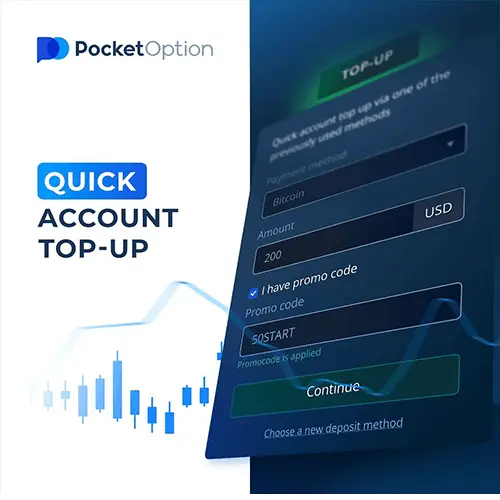
Professional Support for Traders
Registered users have access to various support options, including a personal manager, multilingual support, the ability to create support requests, and live chat.
For direct assistance, users can reach out:
phone +44 20 8123 4499;
email [email protected];
Additionally, there’s an internal knowledge base with step-by-step guides covering all popular trading topics and questions related to trading on Pocket Option Broker.
This comprehensive support infrastructure ensures traders receive the assistance they need to trade comfortably and confidently.
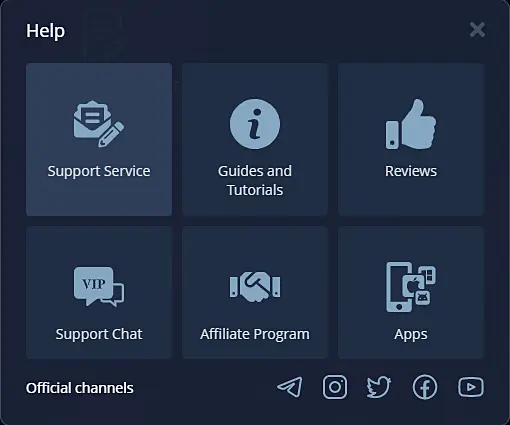
Pocket Option Platform: Binary Trading Essentials for New Users
This overview outlines fundamental trading concepts for beginners entering the financial markets using the Pocket Option. Emphasizing practical insights, it explores key trading principles, providing a foundational understanding for those embarking on their trading in financial markets.

1. Placing an Order. Asset Exploration:
Start trading. Examine a diverse selection of assets, encompassing currency pairs, commodities, and stocks, totaling over a hundred. Noteworthy examples include major pairs like EUR/USD, characterized by a daily trading volume exceeding $1.5 trillion.
Temporal Tactics. Conduct experiments with different time horizons, ranging from short-term intervals (15 minutes) for immediate gains to longer-term durations (1 day) for a more deliberate approach. Historical analysis indicates that trading major currency pairs on a 1-hour timeframe often aligns with prevailing market trends.
Chart Analysis. Employ a range of chart types, utilizing line charts for simplicity and candlestick charts for in-depth insights. For instance, analyzing the historical performance of gold prices through candlestick charts yields valuable trend information.
Trade Dynamics. Fine-tune trade amounts based on risk tolerance, allocating, for instance, 2% of the trading capital. The analysis of the impact of different execution prices on historical trades aids in optimizing entry points.
2. Placing an Express Trade. Asset Diversification:
Diversify predictions across multiple assets to potentially enhance profit. Historical data analysis demonstrates the effectiveness of a diversified approach, concurrently predicting movements in both gold and EUR/USD, mitigating risks.
Candlestick Vigilance. Utilize candlestick charts for heightened visibility of price movements. A comparative analysis of express trade performance across various asset combinations unveils optimal pairings for increased profitability.
Order Oversight. Navigate through open and closed orders via the Express option panel. A comprehensive table detailing the success rates of different asset combinations in express trading over a specified period serves as a valuable guide for decision-making.
3. Monitoring Trades. Real-Time Insight:
Engage in real-time scrutiny using candlestick charts complemented by technical indicators such as RSI and MACD. The historical success rates of trades employing technical indicators inform strategic integration.
Closure Examination. Evaluate closed trades using advanced charting tools like Bollinger Bands for a nuanced understanding of volatility. A tabulated performance review contrasting trades with and without Bollinger Bands unveils the tool’s efficacy.
4. Pending Trades. Temporal Analysis:
Analyze the historical performance of timed trades set against major economic events. A table spotlighting the success rates of timed trades during high-impact economic events assists in strategic planning.
Risk Management. Implement stop-loss orders based on historical drawdown analysis. A tabular presentation of risk-reward ratios delineates the impact of different ratios on overall profitability, providing guidance for optimal risk management.
5. Trading Cryptocurrency (Bitcoin, 90%). Risk-Reward Strategy:
Harmonize the risk-reward strategy, considering a ratio of 1:2 or higher when engaging in cryptocurrency trading. Historical data illustrates the impact of diverse risk-reward ratios on Bitcoin trades, guiding strategic risk management.
Market Sentiment Analysis. Conduct market sentiment analysis through Pocket Option’s economic calendar. A table comparing trades influenced by economic events against those untouched by such influences underscores the importance of market sentiment analysis.
FAQ
What is Pocket Option Broker?
Pocket Options broker is one of the market leaders in binary options and Forex trading. It is a company that provides all users with easy and fast access to the Global Financial Market. Thanks to this, each person gets a unique opportunity to change his life and earn money by trading. Moreover, anyone can easily and quickly access a free demo account with a deposit of $10000. Thanks to this, every beginner can try their hand at the market without the risk of losing their own funds. And experienced traders can risk-free test their trading systems and new trading ideas.
How does Pocket Option work?
The company is active in more than 100 countries around the world and offers its customers advanced technologies, favorable trading conditions and reliable and high-quality service. Once you are on the Pocket Option login platform, you will have access to over 100 of the most sought after and popular trading instruments. You will have access not only to traditional currency pairs, but also to cryptocurrencies, world indices and shares of the world’s leading companies such as Facebook, Google, Tesla and others.
Is Pocket Option available in the Philippines?
The company is active in the Philippines and is very popular with local traders. Especially for residents of the Philippines, the company offers the most popular and convenient ways to deposit.
How to Login Pocket Option account?
Pocket Option login is possible on the official website or using the mobile application. To open a Pocket Option Philippines account and become a member of a friendly team of like-minded people, you only need 5 minutes of free time. The developers have made the process of registering an account as simple and convenient as possible. You can only enter Email, create a password and a trading account will be opened. Also the developers have provided the possibility of registering an account using Facebook or Gmail. In this case, you can link accounts to your account and pocket broker login.
How to Verify Account in Pocket Option?
First, it is worth noting that verification is not carried out of some whim of the broker, but for the implementation of AML and KYC procedures (prevention of fraud and money laundering). It is important for a broker to know that the money was transferred to the card or e-wallet of the client who earned it. This allows you to make sure that in the future there will be no claims against the organization.To successfully pass the verification process in the binary options market, you need to:
– Submit proof of identity to the broker. It can be a scan/photo of your passport or driver’s license.
– Submit a document confirming the client’s residential address. Usually this is a copy of the page of the passport, where the registration is indicated. But often, instead of this document, you can present the broker with another document with the address of the location – for example, an invoice from a mobile operator or a receipt for paying utility bills.
– Confirm replenishment method.The broker can request a photo of a bank card on both sides or a screenshot from the personal account of the electronic wallet, where the operation to replenish the deposit will be visible.
What are some other interesting offerings on the platform?
Pocket Options broker creates favorable conditions for all users. Especially for this purpose, a multi-level system of trading accounts has been developed, which, depending on the experience and capabilities of the client, opens up new opportunities and functions that make trading even more profitable and interesting. An example is the numerous tournaments that the company holds among its users. For the most experienced traders, the prize for first place can reach $50,000. For beginners, simpler tournaments with more modest prizes are available.
How can I find traders to exchange trading experiences with in binary options on the Pocket Option website?
Pocket Option offers various avenues for connecting with traders. You can join group chats, many of which include users from diverse locations, including the Philippines. Official channels and social media accounts are also available for community interaction. Additionally, exploring social trading is a viable option. Here, you can filter traders based on specific criteria, automatically replicate their trades, and learn from their strategies.
Where can I stay updated with the latest news about the trading platform and its features, especially those related to trading platforms?
To stay informed about the latest developments and enhancements of the trading platform, you can regularly check the official Pocket Option website, explore their trading platforms section, and follow their official social media channels. These sources provide real-time updates, announcements, and valuable insights into the trading platform’s functionalities.
Is there a bonus available for new traders on Pocket Option, and what are the associated conditions?
Certainly, Pocket Option extends a welcoming bonus to new traders, providing an opportunity to enhance their initial trading experience. The bonus amount and conditions are subject to change, so it’s advisable for traders to check the latest terms on the official Option Platform. Typically, the bonus is credited upon the first deposit, offering traders an additional boost to their trading capital. Keep in mind that specific terms, such as trading volume requirements, may apply, emphasizing the importance of reviewing the current bonus policy for accurate and updated information.
